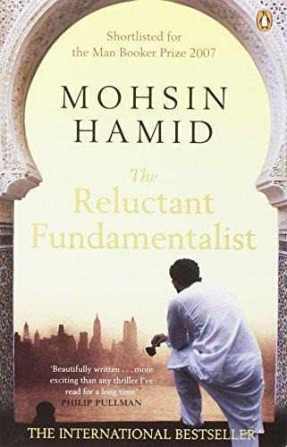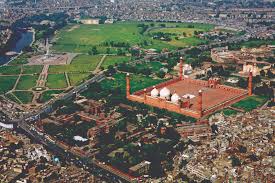“Do not be frightened by my beard: I am a lover of America.”*
Read until the very end! A surprise is waiting all those who wish to dig deeper into Lahore’s culture thanks to my dear friend’s “Cucinare Tra Le Righe” ‘s delicious contibution to this review!
 Changez, born and raised in Lahore, gains a scholarship that allows him to study at Princeton, New York. This is one of the first things he tells to a silent American interlocutor who sits with him at a restaurant in Pakistan, in the present day. His digression continues: as promising and successful as he is humble and hard-working, he is then selected to work for a prestigious valuation company called Underwood Samson. To make his American dream even more ecstatic, he falls in love with an American woman, Erica.
Changez, born and raised in Lahore, gains a scholarship that allows him to study at Princeton, New York. This is one of the first things he tells to a silent American interlocutor who sits with him at a restaurant in Pakistan, in the present day. His digression continues: as promising and successful as he is humble and hard-working, he is then selected to work for a prestigious valuation company called Underwood Samson. To make his American dream even more ecstatic, he falls in love with an American woman, Erica.
So far so good, one might say. However, we ought to recognize that Mohsin Hamid would not have wasted ink on a story which, sweet as it gets, would lack any kind of appeal for the reader who is eager to look for something more engaging than the usual “from rags to riches” narrative pattern which seems to characterize both fairytales and the contemporary, introspective novel concerned with the encounter of the urban and the immigrant “other”. What really makes Changez’s story appealing is the subtlety with which Hamid intertwines the personal narrative with the global one: life in New York is not as promising as it looked, and the shimmering glaze of the late-night parties in Manhattan is soon scratched to reveal a darker, disheartening world shaken and made humanely sterile after 9/11. And the reader will have much to say about the future of this story.
RECOGNITION
From the very first chapters it is clear that Changez is doomed to recognition. This, of course, is not always intended in the best sense of the term: in the USA he is at first identified as the winner of a scholarship, an American – but perhaps less than the others – coming from a faraway land. He is, therefore, other to the Princeton community, and other to the eyes of his employer Jim, as well. While in Princeton’s case recognition comes from academia and bureaucracy, in Underwood Samson he pops in the foreground of Jim’s vision because of his subtle, almost imperceptible yet tangible aura of not-belonging: “’You’re a watchful guy. You know where that comes from?’ I shook my head. ‘It comes from feeling out of place,’ he said. ‘Believe me. I know’” (TRF, 48).

It is precisely this feeling that works in Changez’s mind as a background buzz throughout the whole novel, made a bit louder every time he is faced with the “typically American undercurrent of condescension” (TRF, 63), as in a dialogue with Erica’s father over dinner, where the focus for the man would seem to point out his knowledge of the political crisis in Pakistan, rather than conversing upon lighter, perhaps intimate matters. The otherness Changez carries with himself always disrupts the most trivial events of his life, and it is no coincidence that his dearest friend at Underwood Samson would be an immigrant as well.
PLAY-PRETEND
Interpersonal relationships are, of course, the very nerve of everyone’s life, Changez’s included. He is, in this perspective, as successful at work as he is sexually, but if we consider his close circle we cannot do it but with a sense of bitterness. Erica, (Am)Erica, the love of his life, is in love with a ghost. She lost her boyfriend Chris due to an incurable illness, yet there is nothing as powerful as absence to make one so heavily present in those who loved them.
To be loved by her, Changez has to pretend to be Chris: “’Then pretend,’ I said, ‘pretend I am him.’ I do not know why I said it; I felt overcome and it seemed, suddenly, a possible way forward.” (TRF, 119) Of course, pretending is no easy access to happiness, especially when it comes to love. What could have been a joyous, passionate union of the two of

them – Changez and Erica, Changez and America – is marked by a strong sense of uneasiness, painful indeed: “The entrance between her legs was wet and dilated, but was at the same time oddly rigid; it reminded me – unwillingly – of a wound, giving our sex a violent undertone despite the gentleness with which I attempted to move.” (TRF, 120). His love for Erica is doomed to tragedy, for what is there to do when the one you love lives in the past, and projects all its phantoms on you? Heart-breaking, to say the least.
Pretending is something that will explicitly come to light in the narrative, later on. When Changez is in the Philippines he is faced with the stern, hateful look of a jeepney

driver**. From the inside of the luxurious Underwood Samson car, Changez is deeply hurt by the hostility shown so blatantly by the man outside, and the sensation he feels at that moment haunts him until he “felt like [he] was play-acting when in reality [he] ought to be making [his] way home, like the people on the street outside.” (TRF, 77)
IS THIS NOVEL ANTI-AMERICAN?
The fall of the Twin Towers is what really triggers Changez’s sense of frustration against the country he is living in. After the encounter with the Filipino jeepney driver, his not-belonging increases to the point that, when witnessing 9/11 on the news: “I smiled. Yes, despicable as it may sound, my initial reaction was to be remarkably pleased.” (TRF, 83).
This event, or rather, the policies of the Bush administration after it, trigger Changez. He becomes subject to strict security precautions, his beard now a symbol of potential danger, as his skin, as his name – now so foreign – coming from a land which at this point became nothing but the background to Muslim extremism. Angered by the American invasion of Iraq and attack on Afghanistan, and worried about the country’s absenteeism in the Indo-Pak tension, Changez is not unable to “focus on the fundamentals” (TRF, 112). He eventually goes back to Lahore, leaving his job, incapable of blinding himself to the hate and growing racism of the US, and he becomes a professor.
It would be easy to see this novel as “anti-American”, the USA are clearly the battlefield of Changez’s inner and outer conflict. However, that would be a rather superficial  reading of it all. Changez’s look on the events was, yes, directed to the USA, but simultaneously to a bigger scheme. The aftermath of 9/11 was not just an indicator of the American state of mind, but rather a global alarm bell. It was humanity, which came to lack, not nationality. Of course Hamid’s choice to maintain Changez’s interlocutor silent throughout the whole novel creates a deep bond with the reader, who is left alone in the interpretation of the events, and who has no guide in deciding what is true and what is false. As the author stated in an interview***, it is clearly an unreal setting: after all, it is unlikely that an American in Lahore would be entertained by a stranger for hours on end, willing to listen to his life story and all its minutiae. This is precisely what sets the reader off: the events are real, yet the setting is not.
reading of it all. Changez’s look on the events was, yes, directed to the USA, but simultaneously to a bigger scheme. The aftermath of 9/11 was not just an indicator of the American state of mind, but rather a global alarm bell. It was humanity, which came to lack, not nationality. Of course Hamid’s choice to maintain Changez’s interlocutor silent throughout the whole novel creates a deep bond with the reader, who is left alone in the interpretation of the events, and who has no guide in deciding what is true and what is false. As the author stated in an interview***, it is clearly an unreal setting: after all, it is unlikely that an American in Lahore would be entertained by a stranger for hours on end, willing to listen to his life story and all its minutiae. This is precisely what sets the reader off: the events are real, yet the setting is not.
Thus, what is real, and what is not, in what is being told us? Our moral stance will be questioned in the open ending, which requires us to fill the blanks in so many ways, thanks to our eloquent, fictional – but not so much – interlocutor.
AND NOW…
![IMG_4859[1]](https://example12089.files.wordpress.com/2019/06/img_48591.jpg?w=483&h=681)
BIBLIOGRAPHY AND NOTES
*Hamid, M. (2008) The Reluctant Fundamentalist London: Penguin Books, p.1
** Jeepneys were vehicles built from the rests of abandoned American jeeps on Filipino soil after WWII. Clearly a reminder of the American control over the country.
*** Singh, H. (2012) “Deconstructing Terror: Interview With Mohsin Hamid on ‘The Reluctant Fundamentalist’”, Ariel: A Review of International English Literature, 42/2, pp. 149-56.
